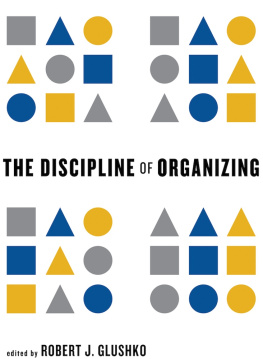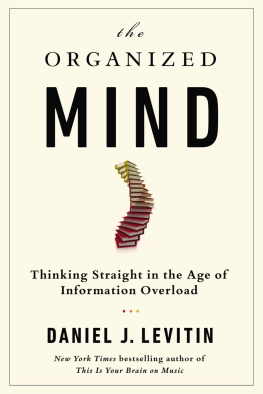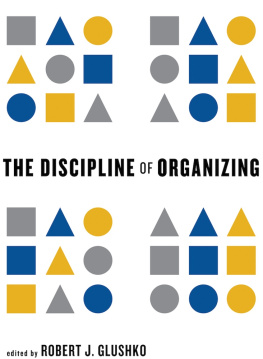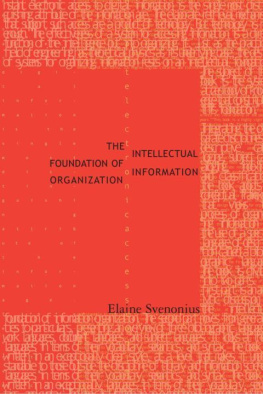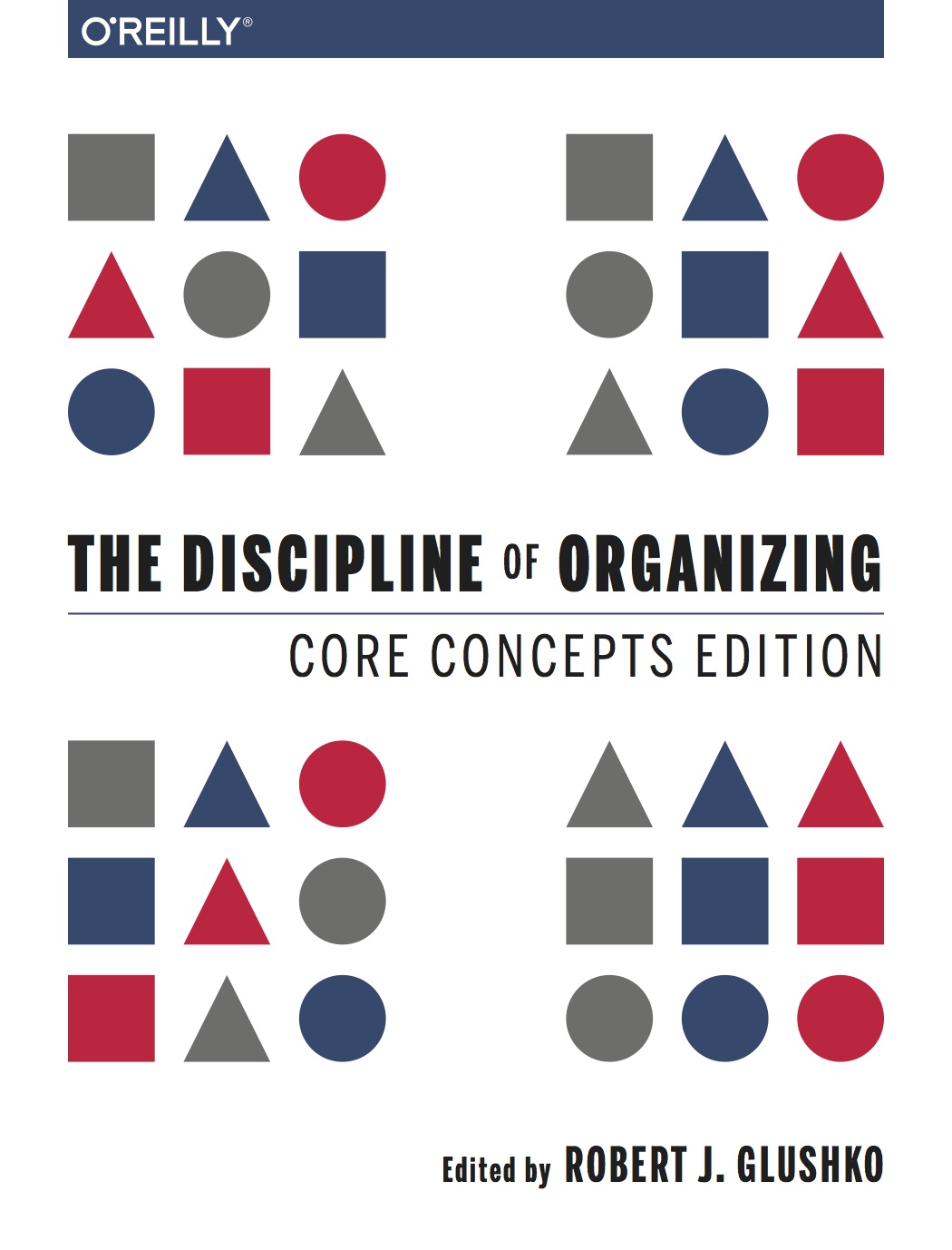The Discipline of Organizing
Core Concepts Edition
Edited by Robert J. Glushko
Principal Authors: Robert J. Glushko , Jess Hemerly , Murray Maloney , Kimra McPherson , Vivien Petras , Ryan Shaw , and Erik Wilde
Contributing Authors: Rachelle Annechino , Matt Earp , J.J.M. Ekaterin , Ryan Greenberg , Ian MacFarland , Michael Manoochehri , Sean Marimpietri , Matthew Mayernik , Karen Joy Nomorosa , Hyunwoo Park , Alberto Pepe , Isabelle Sperano , Daniel D. Turner , and Longhao Wang
Editor: Robert J. Glushko
Principal Authors: Robert J. Glushko , Jess Hemerly , Murray Maloney , Kimra McPherson , Vivien Petras , Ryan Shaw , and Erik Wilde
Contributing Authors: Rachelle Annechino , Matt Earp , J.J.M. Ekaterin , Ryan Greenberg , Ian MacFarland , Michael Manoochehri , Sean Marimpietri , Matthew Mayernik , Karen Joy Nomorosa , Hyunwoo Park , Alberto Pepe , Isabelle Sperano , Daniel D. Turner , and Longhao Wang
Case Study Authors: Ankita Bhosle , Colin Gerber , Ishita Ghosh , Shaun Giudici , Robert J. Glushko , Emilie Hardman , Hassan Jannah , Akos Kokai , Sandra Lee , Ian MacFarland , Murray Maloney , Andrew McConachie , Molly Robison , Becca Stanger , and Suhaib Syed
Cover Designer: Jen Wang
Illustrators: Divya Anand , Ajeeta Dhole , Christina Pham , and Raymon Sutedjo-The
Bibliography Editors: Lisa Jervis , Shohei Narron , and Anne Wootton
Quiz Scriptors: Jacob Hartnell and Alex Milowski
DocBook Consultant: Bob Stayton
Managing Editor: Murray Maloney
Copyright 2013, 2014 Robert J. Glushko
Published by O'Reilly Media. Sebastopol, CA.
All rights reserved. No part of this book may be reproduced, stored in a retrieval system, or transmitted in any form or by any meanselectronic, mechanical, recording or otherwisewithout the prior written consent of the publisher, excepting brief quotes in connection with reviews.
Any trademarks, registered names, or service marks mentioned in this book are the property of the respective holder(s).
The publishers and the authors are not responsible for the persistence or accuracy of the internet addresses (URIs) for websites referred to in this publication and cannot guarantee that the content of any such site is currently, will be, or has ever been suitable for your consumption for any intent or purpose.
Produced in the United States of America.
Library of Congress Cataloging-in-Publication Data
The discipline of organizing / edited by Robert J. Glushko.
p. cm
Includes bibliographical references and index.
ISBN 978-1-491-91203-4 (retail ebook)
1. Information organization.
2. Information resources management.
3. Metadata.
I. Glushko, Robert J., editor of compilation.
Z666.5.D57 2013
025dc23
10 9 8 7 6 5 4 3 2 1
This manifestation of The Discipline of Organizing was produced by Murray Maloney on 2014-08-16 @ 10:11:32 Pacific Time using a bespoke DocBook XSL script dated 2014/07/01 @ 18:40:46 UTC.
Dedication
To Aristotle, Plato, Linnaeus, Condorcet, Wittgenstein...
Panizzi, Cutter, Raganathan, Svenonius...
Gibson, Norman, Rosch, Barsalou...
Adam Smith, Coase, Williamson...
Simon, Salton, Miller, Dumais...
Bush, Engelbart, Nelson, Berners-Lee...
...and the countless others whose diverse perspectives
we have synthesized in the discipline of organizing.
Foreword to the First Edition
Jonathan Grudin
This wonderful book arrives at the right time. It is more than a textbookit defines and creates the field for which it is a text. Befitting a book that lays out a discipline of organization that spans print and digital media, this volume is carefully organized, with a focus on future print and digital editions.
The Discipline of Organizing has a broad scope. Even more valuable is its depth, the result of years of examining and thinking through related conceptsoften overlapping but not identicalfrom the fields of library science, information science, business, and computer science. The rare combination of breadth and depth empowers readers by providing a new perspective and framework for organizing subsequent experiences. The organization is comprehensive and systematic, but it is not simple. A lot of concepts must be assimilated. Yet thanks to the authors thoroughness, you can proceed confident that investing the time to master novel concepts will pay off, that a coherent structure is being assembled, without inconsistencies or confusions. Into this framework you can fit your own examples, alongside the many provided by the authors. You can identify extensions and form new associations, building on a strong foundation.
The authors ask us to step back and adopt a general, multidisciplinary perspective. This is unusual for a textbook. For good reason, the world is marked by increasing specialization, the division of labor on which complex civilization depends. First we master a discipline; then we are encouraged to be multidisciplinary, interdisciplinary, and transdisciplinaryto balance our specialized pursuits. But scholars thrive within single disciplines, and even in fields created as multidisciplinary efforts, such as the neurosciences or cognitive science, most researchers soon become highly specialized. So why should a student of information undertake to master this broad perspective?
By growing from insignificance to centrality in the century-old field of information management in a few decades, digital technology has forced a disciplinary merger. Library science, information science, computer science or informatics, and information systems have developed different terminologies and sets of abstractions. Rather than asking each camp to learn the others languages, the authors ask each of us to engage with a new terminology and set of abstractions.
The analogy of the artificial language Esperanto may come to mind, but we are in a better position. Esperanto is only useful if you are in a community of Esperantists. The abstractions in this book will be useful if others share them, but any reader will benefit by understanding the correspondences across the approaches to information organization that we encounter today. Unlike Esperanto, which is just another language, the concepts in this book reveal linkages and dependencies that we would not otherwise appreciate. The book provides a deep foundation for understanding changes that affect our lives and will do so more in the years ahead, a foundation that you will carry even if much of the time you converse in the language of one or another professional tribe.
Why do I say the timing is perfect, that this effort is worthwhile today? Have people not gotten by without it until now? The answer has two parts. One, which is important even if you have heard it before, is that this is a time of extraordinary change in our uses of information. The other is that people have not always gotten by very well; years have been wasted and careers damaged by not understanding the principles in this book. The likelihood of such wreckage is growing, as the waves of change are larger and come at us faster. On the positive side, the waves offer tremendous opportunity for accomplishment. The coming era of monster waves may be risky if we surf with a narrow focus, but thrilling for those whose view extends up and down the shoreline. I believe that if you read this book, you will see this point and be glad you read it. Let me know.
We are used to hearing about Moores law and related legislation, but familiarity lowers our guard. Human beings do not reason well about exponential growth: our experience is linear, not exponential. What we overlook is that exponential growth can proceed for a long time under the radarone grain of rice, two grains, four grains, etc., not adding up to much, but when it reaches the point of having an impact, the impact comes so fast that we are unprepared for it. Decades passed before accessible digital technology could support high-quality photography, but when the time came, film photography disappeared so quickly that most major companies went bankrupt. Digital audio and video were a long time coming, then panicked and shuttered major industries. The expanding capacity and diminishing cost of information storage alter the balances described in this book. Bandwidth, increasing more slowly, is also reaching disruptive levels. This book provides the best tools available for understanding the disruptions of today and tomorrow in information management.

